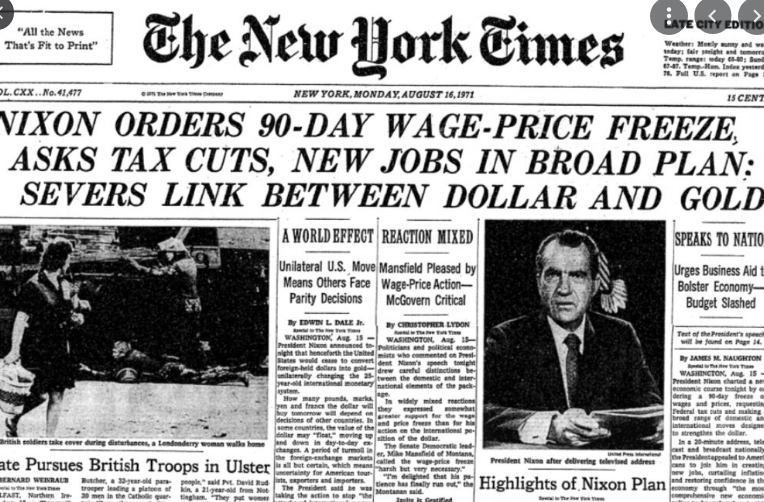I am opposed to the imposition of wage/price controls. As we saw in the early 1970s, they are a terrible idea. Nonetheless, there is an argument for wage/price controls. But it’s not the argument that most of its supporters or opponents might assume.
Wage/price controls cannot stop inflation, which is caused by monetary policy. What wage/price controls might be able to do is prevent high unemployment. The real purpose of wage/price controls is to boost employment, not to reduce inflation.
Suppose you believe (as I do) that nominal wages are sticky in the short run. In that case, a monetary policy that sharply and unexpectedly reduces inflation may lead to a temporary period of high unemployment, until wages adjust to the lower level of nominal spending. In that policy environment, controls on wages might, and I emphasize might, be able to prevent the tight money policy from causing high unemployment.
Notice that I mentioned wage controls, not price controls. The dirty little secret of wage/price controls is that the government’s actual objective is to control wage growth, and the price controls are a fig leaf added to make the policy seem more “fair”, thus making it more politically feasible. The UK government was more honest than most, calling them “incomes policies”.
So why don’t wage/price controls work in the real world? Because they only work if you assume a competent and well-intentioned government, and if you had a competent and well-intentioned government then you never would have had the high persistent inflation in the first place.
Thus in 1971, the corrupt Nixon administration tried to juice the economy with expansionary monetary and fiscal policy in order to get re-elected in 1972, and then simultaneously imposed wage/price controls to delay the adverse effects of this stimulus until after the election.
If you have a credible 2% inflation target, then there is absolutely no benefit to wage/price controls. If you don’t have a credible monetary policy, then wage/price controls won’t solve your problem.


READER COMMENTS
Andrew_FL
Jan 5 2022 at 2:17pm
Wage and price controls can interfere with the measurement of inflation, if they’re very extensive, as happened during World War II. I forget where/when but I believe Milton Friedman compared this method of fighting inflation to fighting a fever by breaking the thermometer.
Scott Sumner
Jan 5 2022 at 3:18pm
That’s right. It doesn’t stop inflation. At best it reduces unemployment (and even on that point I’m skeptical for reasons explained in the post.)
Arqiduka
Jan 5 2022 at 5:31pm
Never thought about it that way but stands to reason.
High unemployment-》 inflation to lower real wages-》 unions get a sniff of the game and ask for higher increases -》 institute wage controls plus fig leaf.
Will freeze relative (nit just absolute) wages though, so will introduce inefficiencies. Would probably work best if enacted with clear short-term sunset provisions.
Mark Z
Jan 5 2022 at 6:17pm
Wouldn’t the price controls have to be explicitly wage controls? That is, price controls on goods and services would not necessarily amount to indirect wage controls, because the same reasons that prevent employers from lowering wages (like worker morale) aren’t solved by price controls; an employer may still react to a price control by just laying people off instead of lowering wages. For this to reliably work, you’d have to come right out and specifically control wages. I guess you could control both, but one would have to keep wages down relative to prices for it to work, which I’m guessing people would notice and not like.
Jose Pablo
Jan 5 2022 at 6:21pm
“inflation, which is caused by monetary policy.”
isn’t it by “fiscal policy”?
https://www.economist.com/finance-and-economics/2021/12/18/has-the-pandemic-shown-inflation-to-be-a-fiscal-phenomenon
https://johnhcochrane.blogspot.com/2022/01/fiscal-inflation.html#more
Comments are closed.